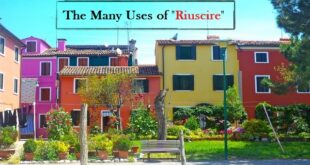The verb mancare has many meanings: to miss/to lose/to lack/to be lacking/to omit/to fail. Perhaps the most common way to use mancare is to convey the idea of missing someone, so it is important to learn the conjugation and sentence structure for this verb for everyday speech. To start off, you should know that the sentence structure used for mancare is the same as for the verb piacere, the prototype for Italian verbs that only take an indirect object pronoun. You should also realize that this group of Italian verbs works differently from its English counterparts. Therefore, the English translation will not match the Italian …
Read More »Search Results for: Imperfetto or Passato Prossimo
The Many Uses of “Riuscire”
The Italian verb riuscire has a wide range of meanings and its use lends a bit of sophistication to one’s Italian phrases. It’s important to learn the nuances of the verb to create sentences as we would in our native language. When linked by the conjunction a to another verb, riuscire means “to be able to” or “to manage to.” The meaning is similar to potere, with an important exception: riuscire lends a dimension of personal effort on the speaker’s part. Hence the translation into English as “to manage to.” In the negative sense, the use of riuscire a implies that …
Read More »The weather in Italian
For a general assessment of the weather, Italians use the multipurpose verb fare (‘to do’ or ‘to make’) in the third person singular, which you’ll remember is fa. In English, the verb ‘to be’ is used to refer to what the weather actually is outside. Instead, Italians speak of what the weather is doing or making. It’s very important to think in Italian if we want to talk about the weather in Italian. Remember that the reference to “it” in the Italian sentence will be left out, as usual. Below are some examples of how this works, with the correct English …
Read More »Italian Past: Avere or Essere?
Every Italian student starts by speaking only in the present tense — that is, about what is happening in the “here and now.” But what if we want to refer back to an event that has happened in the recent past, such as this morning, yesterday, or last year? Well, then, will have to learn how to form the passato prossimo past tense! The passato prossimo translates into English as the present perfect tense and the simple past tense; in effect, when we learn this one type of past tense in Italian, we can substitute it for two types of …
Read More »How we dress
In Italian we need to learn how to use three important verbs and we are all set to talk about what we are wearing—vestirsi, mettersi, and indossare. If we learn how to use these verbs properly, we will be able to tell others how we dress and make “small talk” about how well others are dressed — part of “fare la bella figura” (making a good impression) in Italian — just as we do in our native language! Vestirsi Let’s start with the Italian verb “vestirsi,” which carries the general meaning of “to get dressed.” To use this verb, just conjugate it as …
Read More »“Make Me!”
English speakers use the verb “make” to describe how someone has made them do something or how someone has made them feel. In other words, in this type of situation, the subject of the sentence is the instigator that will make the stated action take place for someone else. The verb “make” is called a “causative verb,” and is one of the three true causative verbs in English, which are: let, have, and make. Check out some popular American songs to see how often this concept comes up in language. Catchy tunes like, “You Make Me Feel Brand New,” sung …
Read More »Marmion Academy
Durante questo semestre, abbiamo imparato la diferenza tra il passato prossimo e l’imperfetto. Ogni studente ha portato una fotografia sua e poi l’abbiamo letta nel passato: che tempo faceva, che ore erano, che cos’è succeso. È stato molto divertente perché gli studenti dopo hanno giocato una parodia di quello che è stato nella fotografia! Poi abbiamo fatto una bella storia con tutte queste loro fotografie inisieme e l’abbiamo recitata ed anche finta! È stato meraviglioso! Abbiamo letto le storie e abbiamo anche fatto una piccola conversazione. Dopo, gli studenti hanno fatto anche delle domande come una intrevista e ogni studente …
Read More » Fra Noi Embrace Your Inner Italian
Fra Noi Embrace Your Inner Italian








